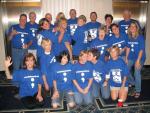Harmless Virus that can Kill Cancer.......... HUMMMMM

By MELLY ALAZRAKI
Posted 11:00 AM 02/06/10 Technology, Healthcare
Comments: 196Print E-mail More Text Size A A A
You'd think that infecting a cancer patient with a virus would be the last thing a doctor would want to do. But what if it was a virus that attacks and kills cancer cells? That's exactly the premise that led to the founding of Oncolytics Biotech (ONCY), a Calgary-based biotechnology company. It's about to begin Phase 3 trials that could pave the way for a marketable cancer treatment based on this technology in two years, says CEO Dr. Brad Thompson (pictured) in an interview with DailyFinance.
"We're working on a product that is widely applicable to quite a few indications of cancer and is based on a naturally occurring virus that's commonly found in the environment and that happens to have a preference of growing in cancer cells as opposed to growing in normal tissue."
It's called a reovirus (short for Respiratory Enteric Orphan virus), and it's a type which most people pick up by age 12 through inhalation or contact that causes few or no health problems. But when the virus enters cancer cells, it kills them.
On-Off Switch
Viruses, naturally, prefer cells that can't fight them off. And these cancer cells all have a common characteristic: They have a certain growth pathway, called the Ras pathway, turned on. "If a cell doesn't have that pathway turned on, nothing happens, so it's like an on-off switch for the virus's growth," Thompson explained. In the human body, very few normal cells have that Ras pathway turned on, and those die in the same amount of time the virus takes to kill them, so the body is not affected. "And that's where the story would end if only these few cells had the Ras pathway turned on all the time," Thompson added. "But it happens to be the state in most cancers."
"When the Ras pathway is turned on, it turns off the virus defense mechanism in the cell so the virus can go in and replicate itself," Thompson continued. It keeps replicating until its host -- the cancer cell -- is overwhelmed and dies, which happens within three days.
"Anywhere between two-thirds to 75% of the primary carcinomas -- ovarian, prostate, non-small cell lung cancer and so on -- actually have that pathway turned on," Thompson said. "In metastatic disease, which spreads beyond the primary tumor, it's between 95% to 100% that have the Ras pathway. So you have a disease that has this pathway, and a virus that for other reasons requires that pathway to grow."
Infecting the Cancer
That's where Oncolytics and its drug, Reolysin, come in play. Reolysin is "a variant of the virus we found in nature," explained Thompson. The treatment "is rather straightforward," he said. It involves five days of intravenous injections, and the side effects are few: Most commonly, patients run a small fever and feel a little tired.
Once the virus has killed the cancer cells, "the body actually clears the virus pretty effectively," Thompson explained, because the body mounts a normal immune response to the infection. "Normally, the latest we ever find the virus in the body is a couple of weeks after the first injection, and then it's completely gone," he says.
The company was founded in 1998 after several scientists at a virology lab in the University of Calgary started having problems growing the virus. As they screened it against established cells they found the correlation with the Ras pathway. "And then this little light bulb went on. Somebody said, wait a minute, that can be useful in oncology," Thompson tells.
Thompson lost his mother and an uncle to cancer, and himself got melanoma. "Right after that, while the surgery was still healing in my leg, I got a call from a colleague of mine in the Alberta government asking me whether I would talk to this group of researchers at the University of Calgary who were working on a virus. I had very heightened sensitivity to cancer at that time and had expertise in the area. So I got a close look at it, and that's how I got involved in it."
"That's how Oncolytics started," he added. "In less than a year, we went public, cross-listed and did six financings."
Phase 3 Clinical Trial
The company has completed about a dozen early-phase clinical trials so far, and has seven to eight ongoing for a broad range of cancers, including melanoma, lung and ovarian. But the real test will be the upcoming Phase 3 clinical trial for head and neck cancer.
The study is designed to combine Reolysin with the standard chemotherapy care for head and neck. In earlier studies, the response rate to the treatment was 42% when Reolysin was added to common therapy, much higher than the average 10% response rate for the disease.
If that response rate holds up, no doubt patients would be eager for the drug to reach the market. "We could be selling product by 2012, if everything lines up properly," said Thompson. "The sad part about head and neck patients is that you know very quickly whether your product works on them or not. The patients we're looking at have a median life expectancy of 4.5 months, so you don't have to wait much to know whether your product had benefit for the patients."
What's Next?
"The real question for us is what comes after that," Thompson added. "We're probably going to have to go after something that has a much larger market than head and neck and will also be a much larger clinical program than head and neck."
"Oncology is a very competitive, crowded space," Thompson acknowledged when asked about competitors. But he added that Oncolytics is looking at diseases that aren't getting much attention elsewhere. This also seems to be good news for patients with those diseases.
For now, Oncolytics has no bigger-company partners, which is rare for a biotech in advanced stages of clinical trials. But Big Pharma has shown interest. "There are very few unpartnered Phase 3 oncology products. So we have certainly raised the interest of a number of our big pharma colleagues." But Oncolytics claims to be in no hurry and prefers to partner when it's best for the company and shareholders. Thompson indicates that a partnership could be announced by the end of the Phase 3 study.
Like all small biotechs, Oncolytics is facing challenges, most notably the possibility that its experimental drug will not work in late-stage trials despite positive early indications. But if anything, it's encouraging to see companies always in a quest to find improved treatments for a deadly disease.
Jennie
Comments
-
Pail of water
Re:
"Like all small biotechs, Oncolytics is facing challenges, most notably the possibility
that its experimental drug will not work in late-stage trials despite positive early indications. "
It never ceases to amaze me how the billions of dollars of donations and
US tax money does so little here in the US, while small biotech companies
in other countries make such remarkable advances.
Does anyone really think that a cure for cancer will be permitted to be marketed, when
it will destroy the multi-billion dollar cancer industry?
I'll believe it when I see it..... should I live long enough....
Samples of past tries:
Hydrazine Sulfate
Trovax
(phooie)0 -
Jennie
I am glad to hear that they are still working on this kind of thing. Several years ago George's niece, age 42, died of gioblastoma (same brain cancer as Kennedy and Tim McGraw's dad). Never spreads outside the brain, is a fairly small tumor but sends out tenacles and that is what robs you of different brain functions, ultimately death. Treatment had not changed in 20 years, nothing worked. Kathy was 42 and an Oakland County Sheriff so she was physically fit, vegitarian, the whole thing so instad of the usual 6 month prognosis, she lived 18 months, if you could call it living. Anyway, she volunteered at Henry Ford Hospital for a trial where they put a laboratory developed virus into the brain tumor, hopefully, to kill the tumor then if anything worked, they would go in and kill the virus. Was real science fiction when they did it but she was ready for them to throw anything at her they could. Unfortunately, it did not work, but she was in that head/neck group. Even though it did not work, it really paved the way for research. She left behind a 6 and 8 year old daughters. Tina0 -
Quantum Immunologics
This is a cutting edge organization, here in the US, which is making fantastic progress in the fight against cancer. Currently, it's being done on breast cancer, but the process will eventually work for ALL CANCERS.
http://quantumimmunologics.com/
Time will tell!
Stacy0 -
Pail of Water?John23 said:Pail of water
Re:
"Like all small biotechs, Oncolytics is facing challenges, most notably the possibility
that its experimental drug will not work in late-stage trials despite positive early indications. "
It never ceases to amaze me how the billions of dollars of donations and
US tax money does so little here in the US, while small biotech companies
in other countries make such remarkable advances.
Does anyone really think that a cure for cancer will be permitted to be marketed, when
it will destroy the multi-billion dollar cancer industry?
I'll believe it when I see it..... should I live long enough....
Samples of past tries:
Hydrazine Sulfate
Trovax
(phooie)
I don't get that reference John.
There are times where in the back of my mind I have a similar thought. It's obvious how big the pharmaceutical industry is and I could see them stalling or burying a possible cure. The thought of it is sickening and I really hope that it would never be the case but if you look at what drives business ($$$) it certainly is not that far fetched. Look at the auto industry. We knew back in the 70's with the gas crisis that we needed to find alternative energy. What did we do? NOTHING. Well, they really did do something, they built BIGGER CARS.
Why? Take a guess.
-p
also, look at marijuana. They are trying their hardest to keep that illegal.0
Discussion Boards
- All Discussion Boards
- 6 CSN Information
- 6 Welcome to CSN
- 121.2K Cancer specific
- 2.8K Anal Cancer
- 440 Bladder Cancer
- 306 Bone Cancers
- 1.6K Brain Cancer
- 28.4K Breast Cancer
- 391 Childhood Cancers
- 27.9K Colorectal Cancer
- 4.6K Esophageal Cancer
- 1.2K Gynecological Cancers (other than ovarian and uterine)
- 12.9K Head and Neck Cancer
- 6.3K Kidney Cancer
- 666 Leukemia
- 789 Liver Cancer
- 4.1K Lung Cancer
- 5.1K Lymphoma (Hodgkin and Non-Hodgkin)
- 235 Multiple Myeloma
- 7.1K Ovarian Cancer
- 53 Pancreatic Cancer
- 486 Peritoneal Cancer
- 5.3K Prostate Cancer
- 1.2K Rare and Other Cancers
- 532 Sarcoma
- 717 Skin Cancer
- 647 Stomach Cancer
- 190 Testicular Cancer
- 1.5K Thyroid Cancer
- 5.8K Uterine/Endometrial Cancer
- 6.3K Lifestyle Discussion Boards



